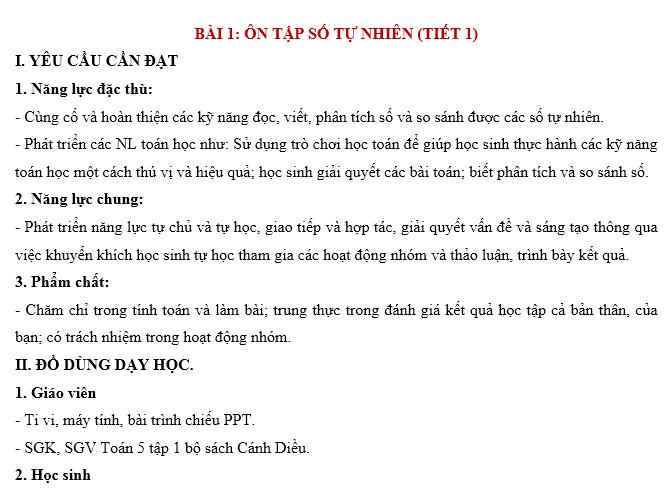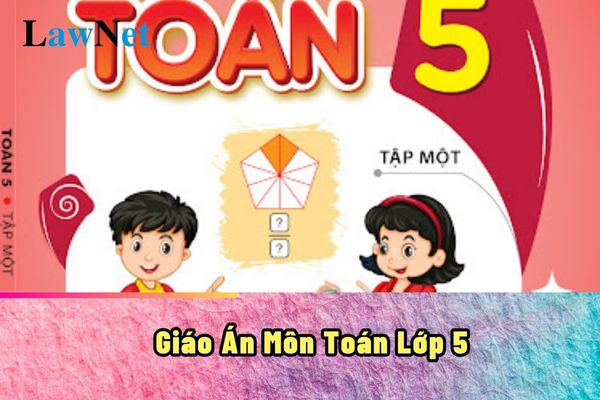Vietnam: How to prepare Grade 5 lesson plans for week 1 of Canh Dieu's maths program?
What are the details of Grade 5 lesson plans for week 1 of Canh Dieu's maths program?
On August 1, 2024, the Ministry of Education and Training issued Decision 2045/QD-BGDDT regarding the Framework Plan for the academic year 2024 - 2025.
The Ministry of Education and Training of Vietnam stipulates that the earliest school opening is one week prior to the school commencement date. For Grade 1, the school opening is two weeks prior to the school commencement date.
>>>Official: The opening ceremony of the new school year will be held on September 5, 2024<<<
Students nationwide will officially commence the academic year on Thursday, September 5, 2024 (equivalent to August 3, 2024, in the lunar calendar).
Therefore, preparing lesson plans for teachers is essential when returning to the teaching process for the new academic year.
Teachers in Vietnam can refer to the Grade 5 lesson plans for week 1 of Canh Dieu's maths program as follows:

Download the Grade 5 lesson plans for week 1 of Canh Dieu's maths program.
>> Note: The information is for reference purposes only. The selection of teaching textbooks depends on the school's choice where the teacher works. Teachers can refer to the content of the above lesson plan.

Grade 5 Mathematics Lesson Plan under "Canh Dieu" for the 2024-2025 academic year? (Image from the Internet)
What are the characteristics of Maths for Grade 5 in Vietnam?
According to Section 1 of the General Education Mathematics Program issued together with Circular 32/2018/TT-BGDDT:
- Mathematics increasingly has many applications in life; basic mathematical knowledge and skills help people solve real-life problems systematically and accurately, contributing to societal development.
- Mathematics at the general education level contributes to forming and developing essential qualities, general capabilities, and mathematical competencies for students; helps students develop core knowledge and skills and create opportunities to experience and apply mathematics in practice; establishes connections between mathematical ideas, between Mathematics and practical life, and with other subjects and educational activities, particularly with the sciences, natural sciences, Physics, Chemistry, Biology, Technology, and Informatics to implement STEM education.
- The content of Mathematics is typically logical, abstract, and general. Therefore, to understand and learn Mathematics, the school Mathematics program needs to balance between “learning” knowledge and “applying” knowledge to solve specific problems.
- During the process of learning and applying mathematics, students always have the opportunity to use technological means, modern teaching equipment, particularly electronic and handheld calculators to assist in demonstrating, exploring knowledge, and solving mathematical problems.
- In the general education program, Mathematics is a compulsory subject from Grade 1 to Grade 12.
The content of mathematics education is divided into two phases:
+ Basic Education Phase:
The subject of Mathematics helps students systematically understand the essential concepts, principles, and mathematical rules necessary for everyone, laying the foundation for learning at subsequent levels or for daily life.
+ Career-oriented Education Phase:
++ The subject of Mathematics helps students gain a relatively comprehensive view of mathematics, understand the role and applications of mathematics in practice, and related professions, enabling students to orient their careers and independently explore mathematical issues throughout their lives.
++ Besides the core educational content, each academic year, students (especially those oriented towards natural science and technology) can choose to study several specialized topics.
++ These specialized topics enhance knowledge about mathematics, the ability to apply mathematical knowledge in practice, and cater to the interests, needs, and career orientation of students.
+ The Mathematics curriculum in both educational phases has a linear structure combined with the “spiral concentrism” (concentrism, expansion, and gradual elevation), revolving around and integrating three knowledge streams:
++ Numbers, Algebra, and Some Elements of Calculus; Geometry and Measurement; Statistics and Probability.
Is it necessary to simplify the curriculum of Maths subject for Grade 5 when developing the teaching program in Vietnam?
According to Section 2 of the General Education Mathematics Program issued together with Circular 32/2018/TT-BGDDT:
The Mathematics curriculum adheres to the fundamental regulations stated in the overall program; inherits and promotes the advantages of the current and previous programs; selectively adopts the experiences of advanced countries worldwide in constructing subject programs; approaches achievements in educational science considering economic and social conditions in Vietnam.
Simultaneously, the Mathematics curriculum emphasizes several viewpoints:
- Ensuring simplicity, practicality, and modern relevance
The Mathematics curriculum ensures simplicity, practicality, and modernity by reflecting contents that must be addressed in general education, meeting the world understanding and interests of learners, suitable for today’s world approach. The program adheres to the spirit of “mathematics for everyone”; everyone can learn Mathematics but each person can learn it in a way that suits their personal preferences and abilities.
The Mathematics curriculum emphasizes application, connection with reality, or other subjects and educational activities, particularly subjects aiming to implement STEM education, aligned with modern development trends in the economy, science, social life, and pressing global issues (such as climate change, sustainable development, financial education,...).
This is also reflected through practical and experiential activities in mathematics education in various forms such as: conducting mathematics projects, particularly projects on applying mathematics in practice.
Organizing math learning games, math clubs, forums, workshops, math contests,... creates opportunities for students to apply their knowledge, skills, and experience creatively in practice.

